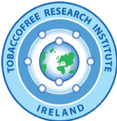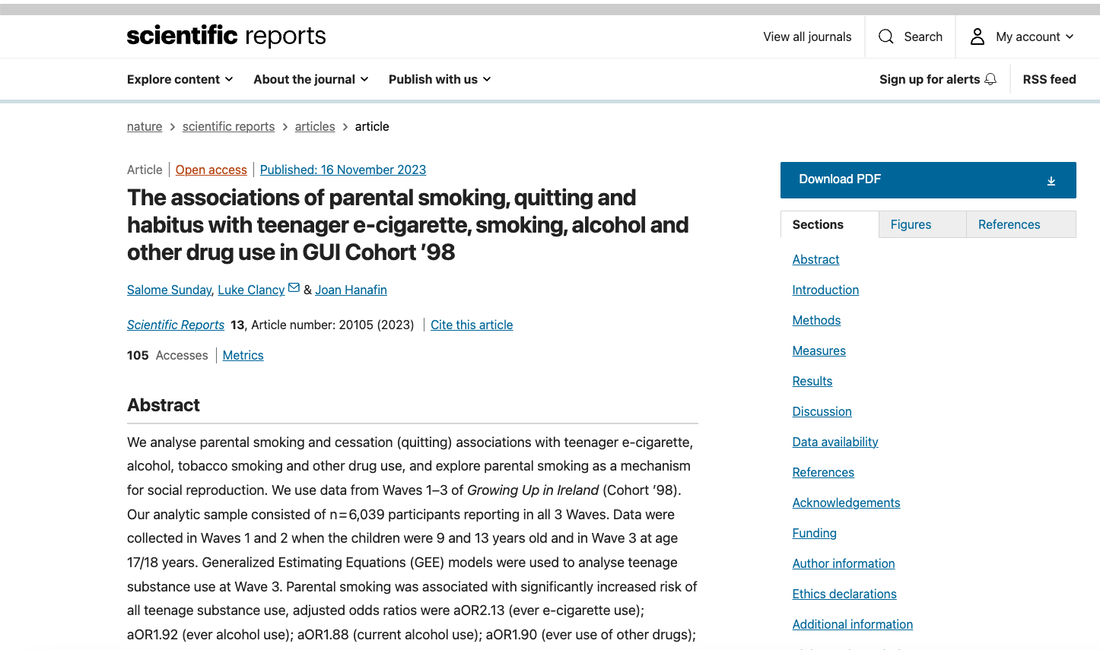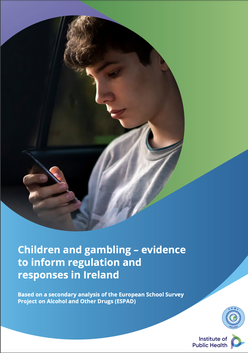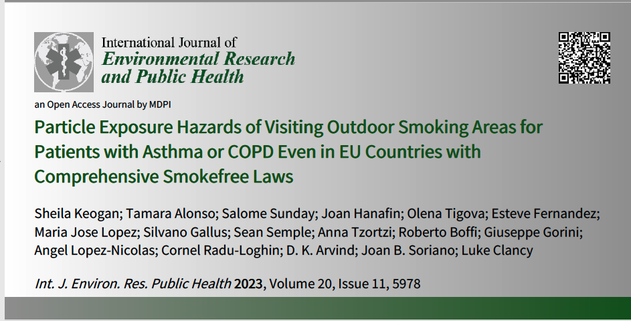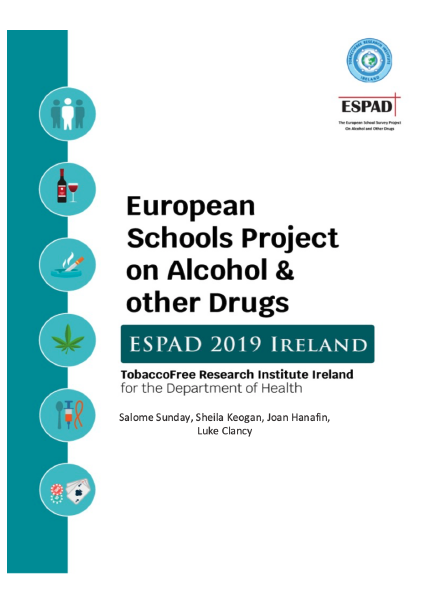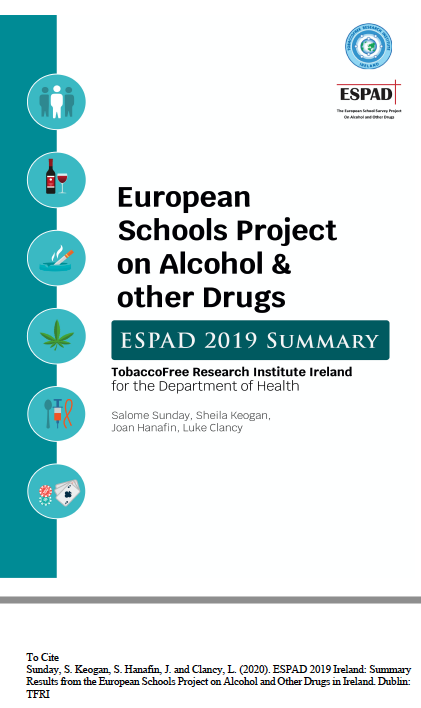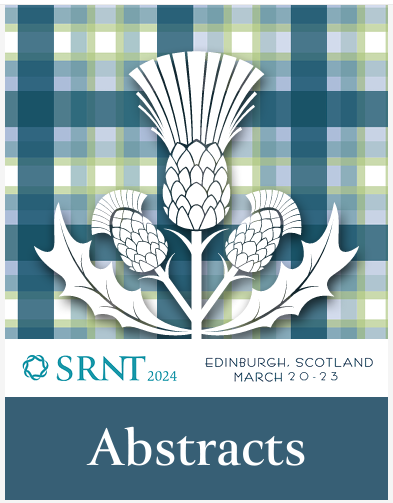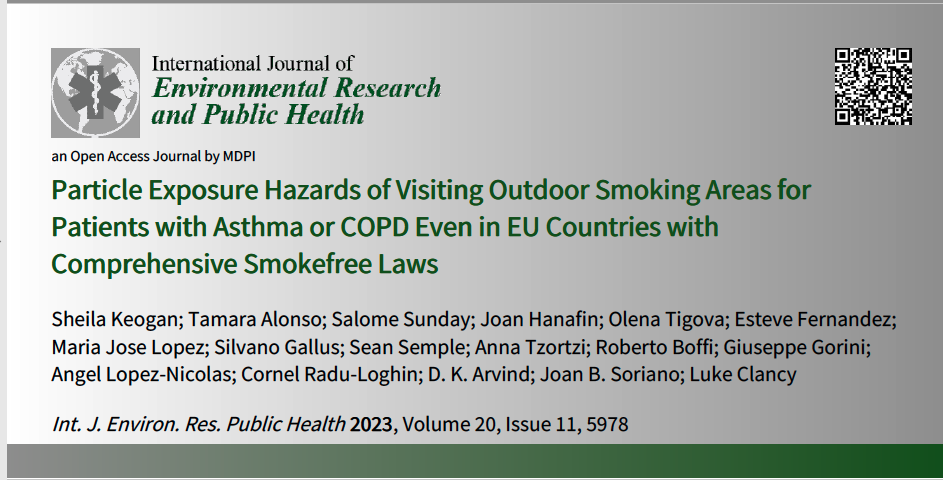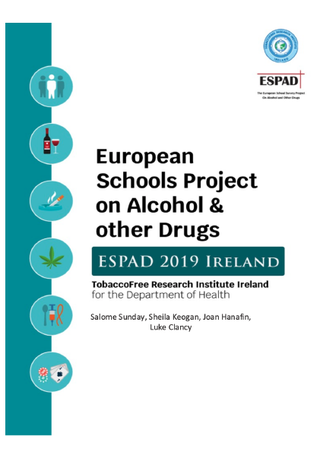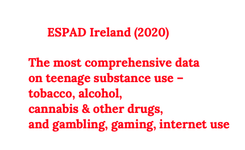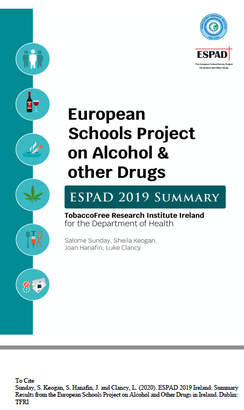Highlighted TFRI Publications
|
Article from TFRI published in Nature journal Scientific Reports, Impact Factor 4.99 & 5th most-cited journal in the world.
The associations of parental smoking, quitting and habitus with teenager e-cigarette, smoking, alcohol and other drug use in GUI Cohort ’98 by Salome Sunday, Luke Clancy and Joan Hanafin New report from TFRI and IPH
Children and gambling - evidence to inform regulation and responses in Ireland Overall, 22.9% of 16-year-olds in Ireland reported gambling for money in the previous year, higher among boys (28.2%) than girls (17.9%). Of those, 10.3% experienced excessive gambling, and 5.6% met the criteria for problem gambling. Important new finding published in the International Journal of Environmental Research and Public Health
Secondhand Smoke in legal outside smoking areas of pubs in Ireland, Czechia and Spain exposed patients with COPD and Asthma to harmful levels of particles which acutely affected their breathing. |
|
ESPAD Full Report Best available data on use of alcohol, tobacco, e-cigarettes, drugs, gambling, gaming and social media use among 16-year-olds in Ireland ESPAD 2019 Ireland: Results from the European Schools Project on Alcohol and Other Drugs in Ireland. S Sunday, S Keogan, J Hanafin, L Clancy. Dublin: TFRI. 2020. ISBN: 978-0-9557528-4-1 |
|
ESPAD Summary Report Summary data on use of alcohol, tobacco, e-cigarettes, drugs, gambling, gaming and social media use among 16-year-olds ESPAD is funded by the Department of Health |
Current and Upcoming Events
TFRI will contribute to the
Smoking and e-cigarette use in young adults with blindness, deafness, or serious vision or hearing impairments
Joan Hanafin, Salome Sunday, Luke Clancy
Joan Hanafin, Salome Sunday, Luke Clancy
TFRI contributed to
CRN & UCD CHiLD-RC annual conference, University College Dublin, 6 December 2023
IPH Joint North South Public Health Conference The Health-Wealth Divide - Leaving No One Behind, Belfast, 29 November 2023
UK Public Health Science Conference, London, 24 November 2023
Irish Thoracic Society Annual Meeting, Limerick, 9-11 November 2023
16th European Public Health Conference, Convention Centre Dublin, 8-11 November 2023
8th ENSP-ECTC Conference, Florence, Italy, 10-12 October 2023
ESPAD Regional Seminar, Valletta, Malta 14-15 September 2023
16th UK and Ireland Occupational and Environmental Epidemiology Conference, Grangegorman Campus, TU Dublin, 9 June 2023
Environmental Health Association of Ireland (EHAI) Forum, Sligo, 18-19 May 2023
European Conference on Tobacco or Health 2023 Madrid, Spain, 26-28 April 2023
HSE News
HSE Stop Smoking Campaign at QUIT.ie
TFRI Media and Conference Activities
- Sunday Times 26 November 2023. ‘Teenagers more likely to smoke if parents do’. Article by Lynne Kelleher about TFRI research published in Scientific Reports.
- On 16 October 2023 Virgin Media Ireland Am programme interviewed 12-year-old Sarah who was rushed to ICU and put into an induced coma due to vaping. Prof Luke Clancy was interviewed on the dangers of the use of e-cigarettes and the need for legislation. See the programme clip here.
- Newstalk 9 November 2023, Prof Luke Clancy was interviewed for News about e-cigarette legislation planned for New Zealand and implications for Ireland.
- The Pat Kenny Show on Newstalk invited Prof Luke Clancy to talk about e-cigarettes on Thursday 6th July. Listen to the interview with Ivan Yates presenter here. at about 150 minutes in. Topics discussed include nicotine addiction, teenagers' developing brains, single-use e-cigarettes, and environmental and electronic waste from e-cigarettes. Prof Clancy discusses how the framing of e-cigarettes as an alternative to cigarettes has led to an emphasis in the wrong places and resulted in their widespread use in young people who had never smoked and have now become addicted to nicotine.
- Salome Sunday, TFRI Researcher and IRC PhD Scholar gave a seminar to nurses and physiotherapists at the Asthma Society of Ireland about E-Cigarette Use among Irish Teenagers and Young Adults on 16 June 2023. See it here.
- The 16th UK and Ireland Occupational and Environmental Epidemiology Conference took place at the Grangegorman Campus, TU Dublin on 9 June 2023. Prof Luke Clancy gave an invited talk on Clearing the Air - From Smog, to Smoke, to Vape. See it here.
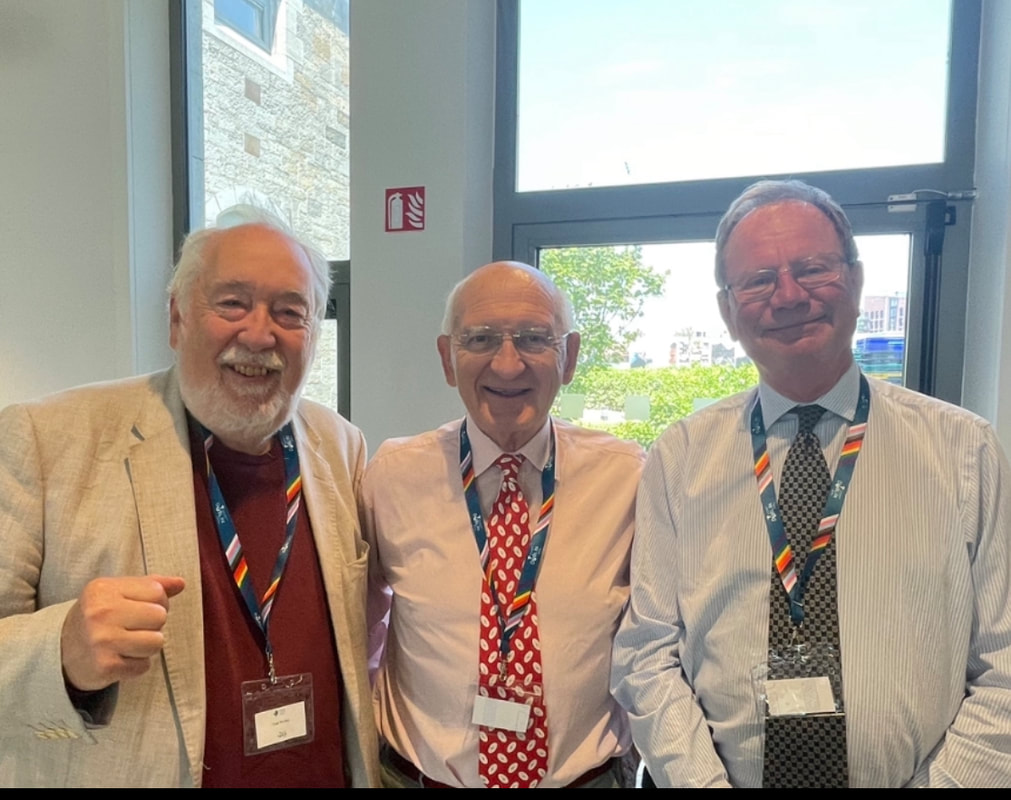
- Approval was received by Government on 30 May to publish the Public Health (Tobacco Products and Nicotine Inhaling Products) Bill and bring it forward for enactment. The Bill will:prohibit the sale of nicotine inhaling products to anyone under 18 years
prohibit the sale of tobacco products and nicotine inhaling products at events for children
prohibit the self-service sale of tobacco products and nicotine inhaling products
introduce a strict licensing system for the retail sale of tobacco products and nicotine inhaling products
prohibit the advertising of nicotine inhaling products around schools and on public transport
provide additional enforcement powers to the Environmental Health Service for measures in the Bill and for all previous Tobacco Control Acts.
Prof Luke Clancy welcomed this move but noted weaknesses in the proposed legislation on The Tonight Show on Virgin Media (30 May 2023) and on KFM radio (31 May 2023). Listen to the podcast of the Tonight Show here.
- The Australian government is set to ban e-cigarettes through a heavy set of controls on imports and packaging to discourage vaping, especially among teens, under its biggest smoking reforms in more than a decade. Irish legislation is due to be introduced in July 2023. Prof Luke Clancy was interviewed about these and other e-cigarette topics on 1 May Newstalk, 2 May East Coast Radio (11.05am), 2 May Kildare FM.
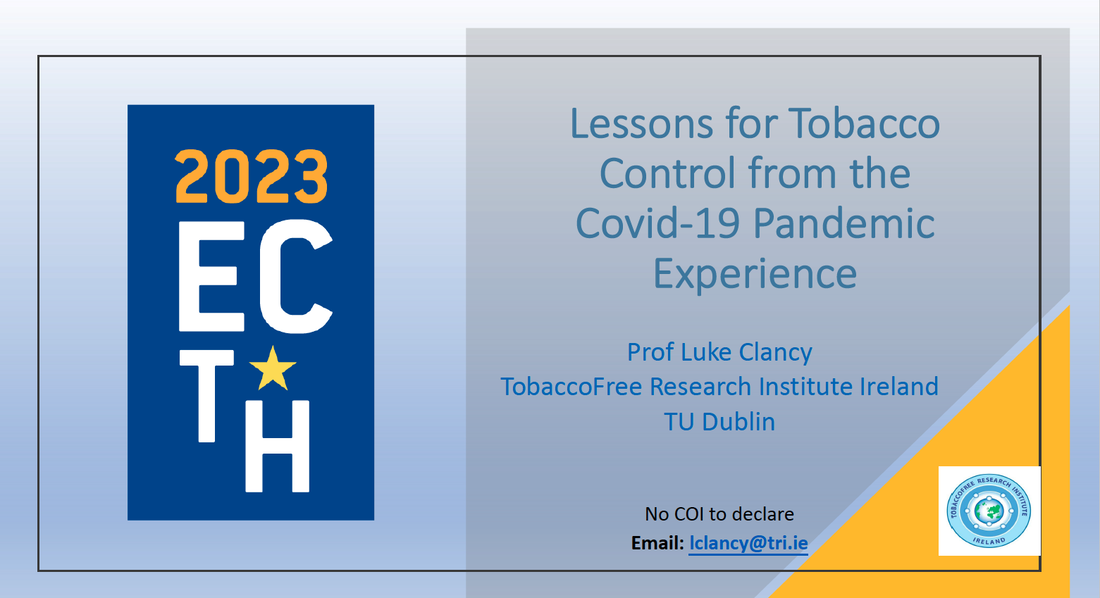
- The 9th European Conference on Tobacco or Health (ECToH) was held in Madrid, from 26th to 28th April 2023. ECToHs are organised every three years under the auspices of the Association of European Cancer Leagues. These Conferences are recognised internationally as a key European and global forum for tobacco control advocates. Each ECToH is attended by the most important policy makers, scientists, researchers, advocacy officers, health professionals as well as all others strongly committed in the fight against tobacco. This year the conference mainly focused on promoting health equity in tobacco prevention and control in order to eliminate disparities, with a particular emphasis on vulnerable groups. TFRI made 2 presentations to the conference. Prof Luke Clancy was invited to participate in a panel on Covid and Tobacco and gave a paper titled Lessons for Tobacco Control from the Covid-19 Pandemic Experience. Dr Joan Hanafin, for TFRI and the IPH presented on Links between Smoking, E-cigarette and Cannabis use, and Gambling in Ireland: What are the odds?
- As part of The Conversation from RTÉ's Upfront with Katie Hannon, Prof Luke Clancy joined Upfront's WhatsApp group to discuss whether flavoured e-cigarettes products should be banned www.rte.ie/news/upfront/2023/0415/1377033-should-flavoured-vaping-products-be-banned/
- TFRI is co-ordinating the Irish limb of a new European Citizens' Initiative called Tobacco-Free Europe. More info here.
- New littering legislation requires the tobacco industry to at least partially fund the pollution it is causing. Prof Luke Clancy spoke on KFM on 5th January 2023 about greenwashing and the importance of excluding the industry from involvement in public health.
- Morning Ireland 3rd January 2023. Prof Luke Clancy reported on the new HSE Quit campaign and on reasons why smoking hasn’t decreased since 2019.
- Greenwashing and Tobacco Litter: East Coast Radio 4th January 2023 Prof Clancy spoke again on greenwashing and tobacco litter.
- Newstalk 31 Dec 22 News Prof Luke Clancy spoke about the new government legislation that has a proposal to make tobacco companies contribute to clean up from cigarette litter on streets from January 2023. The move is part of legislative changes made by Minister for the Environment Eamon Ryan in compliance with a European Union directive which bans single-use plastic straws, cutlery and other disposable plastics. The Tobacco Free Institute of Ireland has welcomed the move, but is concerned that companies will use it to greenwash their products. Greenwashing is a form of advertising or marketing spin in which green marketing is deceptively used to persuade the public that an organisation's products and policies are environmentally friendly. Director General, Professor Luke Clancy told Newstalk that the way the new scheme is run is what's most important, saying that when similar legislation was introduced in France, "the industry turned it around and made it an opportunity for greenwashing … setting up NGOs to help with the collection of litter." They tried to put the responsibility of pollution on smokers, he said, rather than the companies selling cigarettes.
- Irish Thoracic Society Annual Scientific Meeting 1st - 3rd December 2022. TFRI made 2 presentations.
- European Respiratory Society International Congress 2022: The ERS International Congress 2022 was hosted in Barcelona, Spain on 4th to 6th September 2022. TFRI made 6 presentations/posters including 2 that were selected for presentation at the 10 best abstracts in Epidemiology Session.
- Flavours in e-cigarettes. On 25th July 2022 Prof Luke Clancy was interviewed on the Joe Finnegan Show on Shannonside Northern Sound FM Radio about banning flavours in e-cigarettes and age restrictions. Listen here.
- Health problems related to e-cigarette use. Prof Luke Clancy contributed to a newspaper article on 13th July 2022 about dangers from e-cigarette use, especially to young people. Read it here.
- Discussion about E-cigarettes and Vaping on Virgin Media Ireland AM 5 July 2022 with Prof Luke Clancy and Dr Garrett McGovern. All agreed that the major increase in E-cigarette use in teenagers shown in TFRI's ESPAD reports is worrying and needs urgent action especially as it appears linked to increased smoking in 16-year-olds. Prof Clancy said that e-cigarette flavourings should be banned because they are only used to attract users. Alan Hughes remarked on the undesirability of people vaping in enclosed spaces. Watch the full interview here.
- Jump in the use of disposable e-cigarettes is a “cause for concern”: Disposable vapes will 'get a whole new generation of people addicted to nicotine' said Professor Colin O’Gara at UCD School of Medicine and Professor Luke Clancy responded on behalf of the Tobacco Free Research Institute Ireland on Newstalk Breakfast (30th June 2022) and spoke some more about TFRI's work on this topic. Click here to listen to the interview.
- An OpEd co-authored by Prof Luke Clancy was published in Le Monde on 31st May 2022 European Union must stop tobacco industry's greenwashing about tobacco industry attempts to present itself as a responsible and environmentally friendly industry in plain contradiction of how, throughout their whole life cycle, tobacco products are responsible for environmental pollution and degradation, such as deforestation, the poisoning of water, air, and soil with chemicals and microplastic contamination. Each year, more than 4,5 trillion cigarettes are discarded in the environment. Almost all of them have a cellulose acetate filter attached, a poorly degradable plastic additive which can pollute up to 500L of water and which are the second most found-single use plastic items on beaches in the European Union. Read it here.
- TFRI will make two presentations at the ENSP-ECTC 2022 Conference in Crete, 6-8 July 2022. The two abstracts that have been accepted for presentation are Teenagers’ perceptions of risk from cigarettes and e-cigarettes and Do high achievers have the same relationship with e-cigarettes as cigarettes?
- Warning about excess nicotine content in e-cigarettes. The HSE issued a warning to the public on 19 May 2022 to stop using certain disposable e-cigarettes which are non-compliant with EU tobacco legislation and contain more than the permitted amount of nicotine, 20mg/ml or 2%. Interviewed by Matt Cooper on Today FM's The Last Word, Prof Luke Clancy explained that Nicotine toxicity causes immediate acute effects in users as well as addiction over time. He also discussed e-cigarette Flavours, added to e-cigarettes and intended to make them attractive to children. An additional concern about e-cigarette flavours is that, when inhaled, they may be harmful to the lungs as most particles inhaled in the lung are harmful. Listen to the interview here (17.14-20.14m) .
- Endgame Ireland. Teen Smoking is a Challenge to Ireland’s TobaccoFree Endgame (Sunday S, Hanafin J, Clancy L.) was accepted for a poster presentation at the 28th Annual Meeting of the Society for Research on Nicotine and Tobacco, SRNT, Baltimore, Maryland USA 15-18 March 2022. Salome made the presentation and the poster was one of five selected for a special award, the SRNT Adolescent Network Poster Showcase. The theme of the SRNT 2022 28th Annual Meeting was "INNOVATION AND OPPORTUNITY IN A CHANGING LANDSCAPE: WORKING TOGETHER TO ADVANCE NICOTINE SCIENCE TO ACHIEVE HEALTH EQUITY".
- Increasing the age of sale to 25 years. England’s review of whether it will meet its smokefree aim by 2030 suggests that it will be difficult and it is reported that they may increase the age of sale to as high as 25 years of age. Media interest in this plan in Ireland has been considerable and led to interviews on the advisability of following suit in Ireland. Replying to media enquiries, Prof Luke Clancy said that many countries including Ireland were considering the best approach. In Ireland TFRI research showed how important access to cigarettes and indeed e-cigarettes was, and even the perception of restricted access made a big difference. He supported raising the age and said he hoped this would happen in the context of the Tobacco Bill going through the Oireachtas at present. He said that age alone would not be enough and the other known successful interventions such as price and smokefree areas needed strengthening. He welcomed the idea that the age being considered in England was not confined to protecting children but that, at 25 years, adults would also benefit. He pointed out that for the first time in 25 years smoking in teens had gone up. He pointed out that this was in step with the increase in e-cigarette use which was associated with smoking in TFRI’s ESPAD studies (see Publications page on this website). On that basis, he suggested that the same restrictions should be placed on e-cigarettes as cigarettes. Cessation services, particularly for adults, needed further emphasis and the effect of social media campaigns particularly for young people need further study. You can listen to some of the interviews here and here and here.
- More on a possible Smoking ban for Under-25s from Newstalk: Those aged under 25 could be banned from buying cigarettes in the UK under new plans to be smoke-free by 2030. Should Ireland consider something similar? To debate Newstalk Breakfast spoke to Prof Luke Clancy, Director General of the Tobacco Free Research Institute Ireland and Consultant Respiratory Physician and Ian O’Doherty, Irish Independent Columnist. Listen here.
- Newstalk Lunchtime Live 1 March 2022. Prof Luke Clancy joined Andrea Gilligan on her Lunchtime Live programme and agreed with the Royal College of Physicians in Ireland who appear at the Oireachtas Health Committee today to argue that all tobacco products including e-cigarettes should be banned for sale to people under the age of 21. As the most recent TFRI research has shown that perceived ease of access to tobacco is associated with increased smoking, Prof Clancy said that this measure - which has been passed into Federal Law in the US and also enacted in 39 states (tobacco21.org) - is only one of a number of measures needed to reduce teenage smoking in Ireland which has begun to rise again. Listen here.
- February 2022: TFRI published a new ESPAD Ireland paper on teenagers' ever-use of e-cigarettes from the YETI project funded by RCDHT in Tobacco Induced Diseases (2022); 20 (February) (https://doi.org/10.18332/tid/). Sociodemographic, personal, peer, and familial predictors of e-cigarette ever use in ESPAD Ireland: A forward stepwise logistic regression model.
- Matt Cooper interviewed Prof Luke Clancy on 10 January 2022 for The Last Word on Today FM radio about smoking, vaping and bans.
- On 8 January 2022, following Jacinda Ardern’s plan to end the sale of cigarettes to future generations in New Zealand, John Meagher wrote an article in the Independent Smoke signals: how New Zealand could inspire an Irish tobacco ban and interviewed Prof Luke Clancy who said that smoke-free workplaces and tax hikes have taken us so far but legislation must go further.
- Journalist Colm Keena interviewed Prof Luke Clancy for an article published in the Irish Times (31 December 2021) on the halt in the decline in teenage smoking and the associated rise in vaping headed: For 20 years teenage smoking fell steadily in Ireland. Then along came vaping and it all changed. Speaking about policies to reduce teenage smoking, Prof Clancy said "The public policies that drive down smoking rates include price increases, age restrictions on sales, and bans on advertising. If you want young people to stop smoking, then what works for everyone else, also works for them.”
- On The Hard Shoulder on Newstalk 9 December 2021, Prof Luke Clancy was interviewed about proposals in New Zealand to ban sale of cigarettes to anyone born after 2013.
- On 28 November 2021, in an article headed Steep rise in teens using e-cigarettes as girls increasingly turn to the devices, Lynne Kelleher reported in the Irish Independent on TFRI's findings from a trend analysis of teenage smoking and vaping published in BMC Public Health. Read the full article here.
- Kildare FM With nightclubs about to reopen, Prof Luke Clancy was interviewed on KFM on 20 October 2021 about smoking in outdoor areas and said that if the government want to eliminate smoking they need to clamp down on smoking areas and that smoking areas are attractive for teens. Listen here.
- RTE Drivetime On 20 September, with Cormac Ó hEadhra interviewed Prof Luke Clancy on RTE Drivetime about the rise in teen smoking, especially in boys. Listen here.
- Press Release from the European Respiratory Journal Open Research
The European Respiratory Journal Press Office issued this press release on 20th September about the TFRI paper on the increase in teenage smoking and e-cigarette use in Ireland. Read it here. - Increased smoking and e-cigarette use among Irish teenagers: A new threat to Tobacco Free Ireland 2025
Salome Sunday, Joan Hanafin, Luke Clancy, ERJ Open, doi:10.1183/23120541.00438-2021
In September 2021, TFRI published research from the ESPAD nationally representative sample of teenagers showing an increase in current cigarette smoking associated with an increasing use of e-cigarettes. Other associated factors did not deteriorate between 2015 and 2019, and access to cigarettes was perceived to have become more difficult during that period. Our findings highlight the negative impact that increased youth e-cigarette use had on current teenage cigarette smoking. We suggest that this increase in e-cigarette use by teenagers poses a threat to the Tobacco Free Ireland policy goal of a smoking prevalence less than 5% by 2025. Click here to read the full article. - Tobacco Use and Covid-19. In July 2021, Prof Luke Clancy delivered an invited editorial to the Spanish journal Archivos de Bronconeumología on Tobacco, tobacco control and Covid-19: understanding their associations.
- The Pulse on whyy.org Listen here to Jad Sleiman's podcast from 14th May 2021 on Allen Carr and smoking cessation which includes an interview with Prof Luke Clancy about the first RCT in the world on Allen Carr's Easyway to Stop Smoking which was carried out by TFRI.
- The 10th IPCRG World Conference, hosted by the Primary Care Respiratory Society of Ireland and the International Primary Care Respiratory Group, took place 6-8 May 2021. Prof Luke Clancy spoke at the Opening Plenary Session 30-year Overnight Global Success story in Improving Air Quality and also in Stream 2/Session 2 on Passive Smoking & Respiratory Health. Click here for links
- E-cigarette use in confined spaces can impair indoor air quality and negatively affect bystanders
Environmental and individual exposure to secondhand aerosol of electronic cigarettes in confined spaces: Results from the TackSHS Project†
Indoor Air. 2021;00:1–13. https://doi.org/10.1111/ina.12841
- On 10 June 2021, Prof Luke Clancy told Newstalk Breakfast show that there should be no return to smoking in outdoor areas. He said that more people have died from smoking-related diseases than from Covid-19. He pointed out that the number of Covid deaths to date is approximately 4,000 while 7,000 people had died from smoking related diseases during the pandemic. Something that was entirely preventable, he said. Here's a report about the programme from the Irish Times.
- SRNT 27th Annual Meeting, 24th - 27th February (VIRTUAL)
TFRI had 2 abstracts accepted for publication, and Salome Sunday presented 2 posters for TFRI at the SRNT 27th Annual Meeting. See them here:
Joan Hanafin, Salome Sunday, Sheila Keogan, Luke Clancy. Increase in boys' smoking threatens Ireland's Endgame Projections - European trend analysis of smoking prevalence 1995-2019
Joan Hanafin, Salome Sunday, Sheila Keogan, Luke Clancy. E-cigarette prevalence, motivations for use, and relationship with tobacco – the changing situation in Ireland
Air Pollution. Down To Earth is Newstalk’s dedicated programme about our natural environment and how we address the limits of our planet's resources. From climate change to species extinction, in Down to Earth, Dr Cara Augustenborg covers the toughest challenges with leading experts and celebrated thinkers. In Episode 1 all about air pollution:
- Dr Luke Clancy, Director General of TFRI, on life before and after the smoky coal ban.
- Dr. Clare Noone, NUI Galway, explains why Ireland’s air quality is no laughing matter.
- Martin Fitzpatrick, Air Quality and Noise Control unit, Dublin City Council explains what we need to do next to breathe easier
- Irish Journal of Medical Science, Supplement 1, January 2021
- J Hanafin, S Sunday, S Keogan, L Clancy (2020). Worrying changes in adolescent e-cigarette use 2014-2019: A secondary analysis of five Irish health datasets. Irish Journal of Medical Science, Jan 2021, Vol 190, Suppl 1, S 31, S57-S58
- J Hanafin, S Sunday, S Keogan, L Clancy (2020). Gender difference results in increase in adolescent smoking in 2019 in Ireland- European trend analysis of current smoking prevalence 1995-2019. Irish Journal of Medical Science, Jan 2021, Vol 190, Suppl 1, S34, S57.
- New European Respiratory Society Monograph published Supporting Tobacco Cessation, January 2021
Dr Joan Hanafin and Prof Luke Clancy contributed to the latest ERS Monograph, Supporting Tobacco Cessation. The Monograph provides a comprehensive overview of tobacco cessation, from health policy to patient care. Broad in scope, this state-of-the art collection is broken down into four sections: the changing landscape of the tobacco epidemic and challenges to curb it; treatment of tobacco dependence (pharmacotherapy, behavioural support); improving the care of patients with particular conditions who smoke (asthma, COPD, TB, cardiovascular diseases, etc.); and prevention. It also deals with some of the more controversial topics such as e-cigarettes and web applications. Readers will gain an understanding of how to implement smoking cessation into their everyday practice, but will also expand their knowledge about the policy and systems changes needed for population-wide smoking cessation. Find it here: https://books.ersjournals.com/content/supporting-tobacco-cessation
The ERS Monograph is the quarterly book series from the European Respiratory Society. Each Monograph covers a specific area of respiratory medicine, providing in-depth reviews that give clinicians at all levels a concise, comprehensive guide to symptoms, diagnosis and treatment. Supporting Tobacco Cessation, edited by Sofia Belo Ravara, Elif Dağli, Paraskevi Katsaounou, Keir E. Lewis and Charlotta Pisinger.
Optimising health systems to deliver tobacco-dependence treatment
Lewis Keir E, Belo Ravara Sofia, Papadakis Sophia, Attar-Zadeh Darush, Hanafin Joan, Clancy Luke, Rasmussen Mette, Katsaounou Paraskevi, Fu Dongbo (2021). In: Belo Ravara S, Dağli E, Katsaounou P, et al., eds. Supporting Tobacco Cessation (ERS Monograph). Sheffield, European Respiratory Society, 2021; pp. 118–135. https://doi.org/10.1183/2312508X.10002520
- New study by TFRI published December 2020 in the journal PlosOne: A qualitative study of e-cigarette use among young people in Ireland: Incentives, disincentives, and putative cessation
Prof Clancy said “instead of helping them to stop smoking they reported continuing to smoke or restarted or indeed, started ‘roll-your-own’ for the first time and none of them stayed off cigarettes.”
The participants were sceptical about the healthiness of e-cigarettes, concerned about addictiveness and worried about the long-term effects. They were critical of the advertising that had targeted them and indeed, industry strategies. The study conclusion was that regulation of e-cigarettes through age restriction of access, licensing of outlets, pricing, point of sale and advertising restrictions as well as through the banning of indoor use should be considered by legislators and tobacco control policymakers.
Dr Joan Hanafin, Director of Social Research, TFRI pointed out that “there were health education opportunities suggested by the study in counteracting the misinformation about e-cigarettes young people are getting, largely through social media. They should be informed of the full facts about e-cigarettes, and also about proven successful smoking cessation methods.”
Full paper available here: https://journals.plos.org/plosone/article?id=10.1371/journal.pone.0244203
TFRI presented a paper on E-cigarettes and Teenagers at the ENSP-ECTC conference online webinar: E-cigarettes and Novel Tobacco Products: what do we know so far?
Read it here: Joan Hanafin, Salome Sunday, Luke Clancy. What's Happening with E-cigarettes in Teenagers? Ireland 2014-2019. Paper presented at ENSP-ECTC Conference e-cigarettes and Novell Tobacco Products? What do we know so far, 16 December, 2020, Virtual.
The ITS Annual Scientific Meeting 2020 took place on 3rd and 4th December and the ITS Paediatric Forum on 2nd December 2020. TFRI was represented at both, presenting 2 posters, a poster review and discussion, and 2 oral presentations. Click on links below to read them:
J Hanafin, S Sunday, S Keogan, L Clancy (2020). Poster & Review and Discussion: Worrying Changes in E-cigarette use among Teens
J Hanafin, S Sunday, S Keogan, L Clancy (2020). Poster: Gender Differences in Adolescent Smoking in Ireland and Europe Trend Analysis
J Hanafin, S Sunday, S Keogan, L Clancy (2020). Oral presentation to ITS ASM Paediatric Forum Worrying Changes in E-Cigarette Use
J Hanafin, S Sunday, S Keogan, L Clancy (2020). Oral presentation to ITS ASM Paediatric Forum Gender Differences in Adolescent Smoking
- Launch of ESPAD Ireland 2019, 16th November 2020
The ESPAD Ireland Report 2019, based on a survey of 1967 students born in 2003, who were 15-16 years old when the survey was carried out in a sample of Irish schools in 2019, was launched in November 2020 by TFRI and Department of Health. It features information on students’ experience of, and perceptions about, a variety of substances, including: tobacco, alcohol, illicit drugs, inhalants, pharmaceuticals and new psychoactive substances (NPS). Social media use, gaming and gambling are also covered. This is the seventh data-collection wave conducted by the ESPAD project since 1995, with data collected every 4 years in more than 35 countries.
On 16th November, the Minister of State with Responsibility for Public Health, Wellbeing and the National Drugs Strategy, Frank Feighan TD, launched ESPAD Ireland 2019. Read the Minister's Press Release here. On the same day, TFRI launched ESPAD Ireland 2019 with this press release below:
Main Findings
· The decline in smoking has halted in Irish teens for the first time in 25 years (14%), and has significantly increased to 16% in boys while declining slightly to 13.6 in girls
Dramatic increase in e-cigarette use, especially among boys 39% have tried AND 16% are current users
· Slight increase in drinking and heavy episodic ‘binge’ drinking
· Almost 1 in 5 has tried cannabis and 1 in 10 is a current user
· More than a third spend more than 6 hours on non-school days on social media
· Boys (23%) more likely than girls (7%) to have gambled
Click here for the full report:
S Sunday, S Keogan, J Hanafin, L Clancy (2020). ESPAD 2019 Ireland: Results from the European Schools Project on Alcohol and Other Drugs in Ireland. Dublin: TFRI. ISBN: 978-0-9557528-4-1
Click here for the summary report:
S Sunday, S Keogan, J Hanafin, L Clancy (2020). ESPAD 2019 Ireland: Summary Results from the European Schools Project on Alcohol and Other Drugs in Ireland. Dublin: TFRI. ISBN: 978-0-9557528-5-8
- ENSP-ECTC 2020, October 2020
Prof Luke Clancy, Changes in breathing during exposure to SHS in outside smoking areas of pubs with asthma and COPD in 3 EU countries
Dr Joan Hanafin & Prof Luke Clancy, Does e-cigarette use support smoking cessation? A qualitative study of why young people use e-cigarettes in Ireland.
Dr Joan Hanafin & Prof Luke Clancy, Tobacco-related health education in schools in seven EU cities.
- Milestones and Challenges of Medical Research
On 26th September 2020, Prof Luke Clancy, Director General, TFRI gave a presentation entitled Role of Research in Changing Dublin Smog Forever to FIRMST SS#02 Milestones and Challenges on Medical Research - Panel Discussion
The first webinar, Tobacco and COVID-19: understanding the science and policy implications, was held on Tuesday 29 September 2020 at 14:00 – 15:00 CEST.
This webinar reviewed the literature on the relationship between smoking and COVID-19 available to date; examined the biological mechanisms and risk factors influencing susceptibility to infection; and discussed opportunities afforded by the pandemic to progress tobacco control and reduce tobacco related deaths.
Prof Luke Clancy, Director General of the TobaccoFree Research Institute Ireland (TFRI) Dublin, facilitated discussion between expert speakers Dr Silvano Gallus, Dr Janice Leung and Dr Catherine O. Egbe.
The webinar aimed to:
· Make sense of the published results on the prevalence and severity of COVID-19 in smokers
· Understand the biological mechanisms at play in the interaction between smoking and Sars-CoV-2, and ACE-2 at organ level in COVID-19 disease
· Equip policy makers to prepare for the risks and opportunities which may arise in tobacco control during the COVID-19 pandemic.
- 1st Satellite Event of FIRMST- Forum for Interdisciplinary Research in Medical Science & Technology
Panel Discussion on Epithelial-Mesenchymal Transition and Abstract Presentations by young scientists (under 35 years)
23rd of August 2020. https://www.firmst.tech/
- FIRMST Forum for Interdisciplinary Research in Medical Science and Technology, 4-5 August 2020, Moscow | Online.
- J Hanafin, S Sunday, S Keogan, L Clancy (2020). What’s Happening with E-cigarettes in Ireland: A Trend Analysis 2015 to 2019. FIRMST Forum for Interdisciplinary Research in Medical Science and Technology, Moscow 4th-5th August 2020 | Online. https://www.firmst.tech
- S Sunday, J Hanafin, S Keogan, L Clancy (2020). Smoking in Schools in Ireland. FIRMST Forum for Interdisciplinary Research in Medical Science and Technology, Moscow 4th-5th August 2020 | Online. https://www.firmst.tech
- Conversations on Covid-19 Series
This series of webinars, a joint initiative between ESTHER Alliance for Global Health Partnerships and Irish Global Health Network, hosted experts to discuss COVID-19 topics.
For the 17th Webinar: Men and Covid 19 – How are men affected by Covid 19 and how can the response better include them?, streamed on 17 July 2020, Professor Luke Clancy, DG, TFRI joined Dr Noel Richardson, Director of the National Centre for Men’s Health in Ireland, Professor Maria Lohan, Chair in Social Sciences and Health, Queens University Belfast, Gary Barker, President and CEO, Promundo-US to discuss:
· What disaggregated data exists on Covid 19 with respect to men
· How is Covid 19 impacting on men and how are they coping
· What should the response be doing more of to better meet the needs of men, women, boys and girls
The webinar was moderated by Niall Roche WaSH and Environmental Consultant and Hala Ali Co-coordinator for ESTHER Alliance for Global Health Partnerships. You will find a link to the webinar here and Professor Clancy’s talk on Men, COVID 19 and Smoking is at 46m20s.
Here is a summary of the main points made by speakers at the webinar here: https://esther.eu/wp-content/uploads/2020/08/Men-and-COVID-19-Webinar-Summary-Final.pdf - New research from TFRI in BMJ Open shows Smoking ban and price increases dramatically reduce teen smoking: https://www.imt.ie/news/ban-sees-dramatic-teen-smoking-reduction-18-08-2020/ Full article published August 2020: Does smoke-free legislation work for teens too? A logistic regression analysis of smoking prevalence and gender among 16 years old in Ireland, using the 1995–2015 ESPAD school surveys is available here: https://bmjopen.bmj.com/content/10/8/e032630.info
- TACK SHS: Tackling tobacco-related chronic diseases in Europe: 8_october_tackshs_icolc.docx Novel data from the Horizon 2020 TackSHS project reveals the results of exposure to secondhand smoke (SHS) from cigarettes and second-hand aerosols (SHA) from electronic cigarettes on the respiratory health of European population, the burden of associated mortality and morbidity, and economic consequences for national and European welfare. Press release from final conference.
- New technologies to tackle digital marketing of alcohol, tobacco and unhealthy foods aimed at children and adolescents. A group of experts and stakeholders from all over the WHO European Region recently highlighted the role of new technologies in responding to the harmful impact of digital marketing of alcohol, tobacco and unhealthy foods targeted at children and adolescents.
- New Irish research shows “Allen Carr” is successful for smoking cessation: New study has just been published in the BMJ’s Tobacco Control journal which shows results of the first published Randomised Clinical trial in the world demonstrating that Allen Carr ‘s Easyway to stop smoking is a highly effective treatment to help smokers quit. Full Paper available here.
- SILNER H2020 project launched its findings in Brussels on October 17th 2018
- TFRI deliverable 'Development of policy recommendations' used the empirical evidence generated in the project to develop recommendations for the prevention of youth smoking. More detailed recommendations can be found here.
- Youth turning to cheaper Roll Your Own Tobacco Products: Newspaper Link
- Tobacco Free Ireland (‘TFI’), the report of the Tobacco Policy Review Group, was endorsed by Government and published in October 2013. An Action Plan for TFI was published in March 2015 and one of its actions committed the Department of Health to publish an annual report on the implementation of the Plan.Considerable progress was made in 2017 in implementing the Action Plan as set out in detail in the Annual Report.
- TOB-g project launched its e-learning course November 2017. The Tob-g e-course constitutes a key part of this important project. This course is based on the structure and material of the Tob-g guidelines. Its aim is to provide an individualised approach to smoking cessation within five clearly distinctive sub-populations of smokers, who obviously cannot continue to be treated as a single entity. Teenagers, cardiovascular patients, pregnant women, patients with diabetes and chronic obstructive pulmonary disease (COPD) belong to clearly distinct groups and reasonably so require a tailored approach to treatment.
- Tobacco Cessation Guidelines for High risk populations - TOB-G Now published
- The first new building to be constructed on the Dublin Institute of Technology Grangegorman campus has been opened.The Greenway Hub will be home to the institution’s postgraduate researchers as well as those commercialising their research and growing spin-out companies. The 5-storey €17 million euro building will host DIT’s Environmental Sustainability and Health Institute (ESHI) with researchers working in areas like vision science, food and water quality, energy, bio monitoring and diagnostics, and health policy development. More news:
- Global Public Health Advocates Open New Fronts in War on Tobacco Vienna, Austria—December 5, 2016—Efforts to control tobacco as a public health threat have escalated as clinicians and public health advocates have coalesced to beat back threats from tobacco companies through public advocacy, public health, and pension reform. Read more
- ESPAD Ireland 2015 published, 20th September, 2016
Ireland’s 2015 report on the European Schools Project on Alcohol & other Drugs in Ireland (ESPAD) finds a dramatic reduction in teenage drinking and smoking but concerns over e-cigarettes, drugs and gambling.
Smoking and drinking among 15-16 year-old school students are falling dramatically, but challenges posed by illicit drug use remain. In this age group, Ireland has much lower levels of drinking, binge drinking and smoking than the European average, but higher use of cannabis, inhalants and other drugs. Find out more here. - E-cigarettes as a gateway to tobacco: A US study finds that teenagers who use e-cigarettes are more to become tobacco-smokers.
- European Court of Justice upholds Tobacco Products Directive:Great news from the European Court of Justice – all three challenges against the EU Tobacco Products Directive were rejected today May 4th 2016. The Court rejected the challenge brought by Philip Morris and British American Tobacco which sought to invalidate the TPD as a whole, or alternatively various provisions of the Directive including, inter alia, mandatory large pictorial warnings, the ban on characterising flavours and measures concerning tracking and tracing.
- An assessment of the economic costs of smoking in Ireland: Key findings: It is estimated that smoking causes 5,870 deaths per annum with an additional 92 per annum as a result of exposure to second hand smoke (SHS). This is an increase from an estimated 5,200 deaths per annum previously calculated, the increase is due to more cancers and respiratory diseases being attributable to smoking than heretofore.
Healthcare costs
The estimated cost to the healthcare system as a result of smoking is over a half a billion euro (€506 million) as outlined below:
· Hospital based costs €211 million
· Primary care costs €256 million
· Domiciliary care costs €40 million.
Increased smoking and e-cigarette use among Irish teenagers: A new threat to Tobacco Free Ireland 2025
Salome Sunday, Joan Hanafin, Luke Clancy
|
New research published 28 May 2023 by TFRI and colleagues showing high levels of second-hand smoke (SHS) exposure in outside areas of hospitality premises in three EU countries with comprehensive smokefree laws - Ireland, Spain and Czechia. This SHS exposure was shown to have acute effects on breathing in people with Asthma or COPD. These real-world observations of high SHS exposure and acute breathing changes suggest that all such patients be advised to avoid these areas.
|
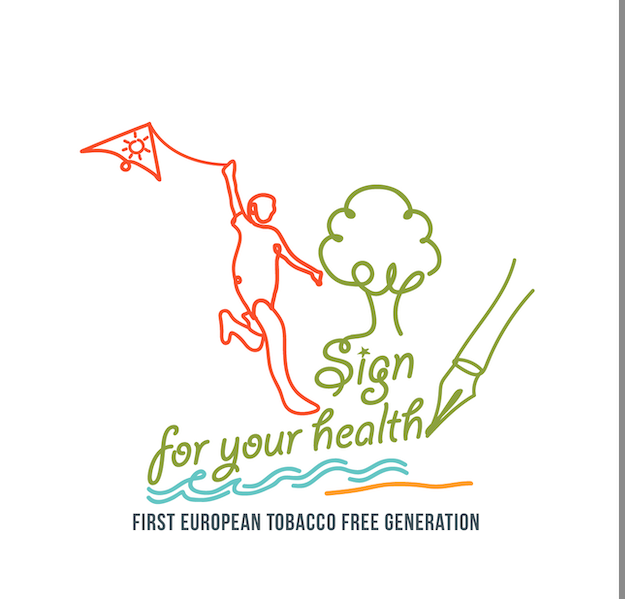
European Citizens' Initiative
Tobacco-Free Europe
Call to achieve a tobacco-free environment
and the first European tobacco-free generation by 2030
1 million signatures needed in the EU
9,165 signatures needed in Ireland
Click here to support
Tobacco-Free Europe
Call to achieve a tobacco-free environment
and the first European tobacco-free generation by 2030
1 million signatures needed in the EU
9,165 signatures needed in Ireland
Click here to support
ESPAD - Click on links below for latest reports
TFRI is Principal Investigator for ESPAD Ireland
|
